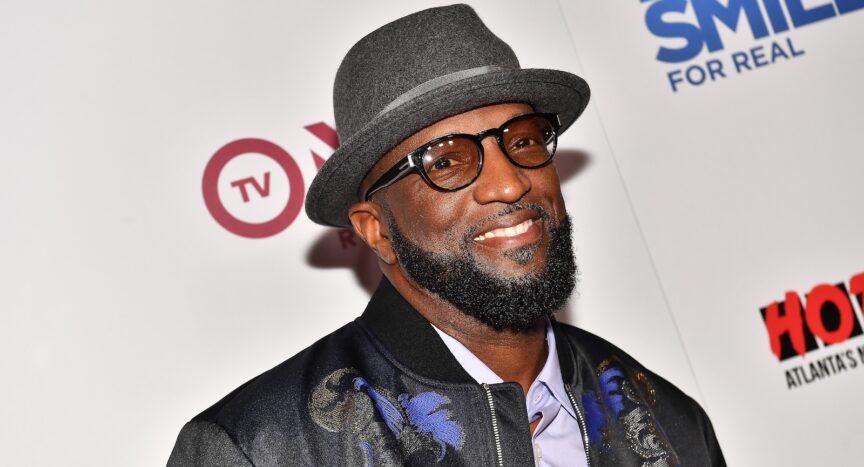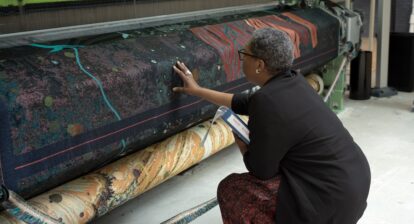Rickey Smiley has been entertaining audiences for over 30 years with his incredible storytelling, character building and innate ability to alchemize our shared experiences into hilarious sets that stand the test of time. From exploding into public consciousness by way of BET’s Comic View to hosting one of the country’s most beloved syndicated radio programs, The Rickey Smiley Morning Show. Whether the funnyman is showing up as himself or any one of his iconic characters, his fans have come to expect equal parts hilarity and a positive message.
Perhaps his penchant for feeling so expertly familiar is why when Smiley announced the passing of his 32-year-old son, Brandon, by accidental overdose in 2023, his pain was felt by us all. What could we possibly give to a man who’d always freely shared his light in his greatest moment of darkness? How would we begin to repay him for the moments he brought smiles to our faces when tears stained his own?
Understandably, there was no guarantee that Smiley would ever return to bring us joy again. However, he returned to his hit radio show mere days after his son’s passing and later set out on the road.
Now, a little over a year since Brandon’s passing, the master of disguise has decided to show us the tears of a clown with his vulnerable and gut-wrenching new memoir Sideshow. In its pages, Smiley details the heartbreaking details of losing his father to the very same addiction his son would lose his battle to. With an honest and transparent pen, the 56-year-old Alabama native peels back the mask of comedy to reveal the heavy burden of tragedy. Faced with unconscionable grief, Smiley uses the book the same way he’s always used his comedy: to platform his unshakable faith and use his own life to inspire others.
EBONY: What resonated with you about the song Sideshow for which the book is titled?
Rickey Smiley: Yes, sideshow, let the sideshow begin. ‘Hurry, hurry, step right on in. You can’t afford to pass it by the guarantee to make you cry.’ So, this clown is bringing you in to entertain you, but he’s sad. It’s a sad show. A lot of times, people see you on stage, but they have no idea what you’re going through or what you’re dealing with. So that’s why the song spoke to me as the right title. It also has ties to my childhood because it was the song that was playing when my father died. He and my son died the same way. And it just all ties together because my son was a comic also. So both of us are on stage, headlining comedians that had our own different issues.
Comedians have a remarkable way of alchemizing pain through humor, but you also turned to writing. How has it helped with the process of grieving Brandon?
It helps you release, that’s for sure. Days where you write, the next day, you spend the next day crying because it brings everything back up, and then the next day, it comes out. Sometimes, it came out while I was writing, and then I had to do the audio version as well. Definitely, I put my heart, my soul and all of my energy into those writing sessions.
Addiction is a common thread in Sideshow, and I’m curious to know how affected your upbringing was by the looming shadow of substance abuse.
Yeah, I sat there and watched my grandparents go through that with my dad. When he died, my grandfather would talk to me every single day, every night, about how my father’s addiction. I would fall asleep with my grandfather still sitting there talking to me. And I just decided that I would never touch alcohol or drugs. I’m 56. I haven’t had a drink or anything my entire life. I just try to honor him and be respectful because I did not want my grandparents to lose me as well, watching what they had already been through. I didn’t want my mom burying me after burying a husband. I just felt a real responsibility.
I imagine that feeling responsible for things that were out of your control is a heavy burden to bear. How did you manage that throughout your life?
It was almost like I just wanted to see my grandparents smile. That bothered me for a long time, and it eats at me to this day. That was April 11, 1974. And I’m watching my grandparents sit on the front row to bury my father, and that affected me mentally and emotionally almost every single day. I’ll never forget that wake, and I’ll never forget that funeral service. I was just determined that I was going to try to do something special to make them smile and give them back what they lost.
You have a large following of faith-based fans. I’m curious how your advocacy for addiction has been received by them as you lean heavily into the power of therapy.
It’s been received with open arms, and I’m really opening people up to therapy because I just give a simple analogy as where if we roll our ankle, we go into the doctor, you hurt your knee, you go into the doctor, if your chest hurt, shoulder hurt, or out of place or rotator cuff, you go into the doctor. Why not go to the doctor for your mind because the brain is a muscle just like every other part of your body. What happens if you don’t go get therapy and go get the help that you need? Well, it’s the same thing that happens when you roll your ankle. Yeah, it heals, but now you have a limp. It’s not hurting, but now you’re also not walking straight. No one takes out a Bible when they hurt their knee; this is no different.
When we go through difficult losses, our faith can be tested. How did you hold on to your beliefs while grieving your son?
It was my faith that got me through it. I had to lean all the way on God. I had nobody else. I had no choice. I was in an apartment all by myself when I got the call about my son. It was God that got me down the hallway. It was God that got me through down the hallway in the airport. And I had to lean totally on him. I was about to die myself, honestly. That was the hardest time. But if I never leaned on God any other time, I had to lean on him that time because that was the only thing they got me through.
In the book, you transparently share your grieving process and how, at times, you’d cry between commercial breaks while recording The Rickey Smiley Show. What have you learned about the importance of properly grieving, especially as a Black man?
According to my therapist, it’s like a pressure cooker. That pressure builds and builds and builds, and every time you cry, you’re popping that cap. You are releasing the steam from the pressure cooker. No matter how busy you are, grief is going to be waiting on you. I can’t tell you how many days I sat on the third step in my kitchen and released cries that would echo through the whole house. I would just cry until I couldn’t cry anymore. My son died on a Sunday, and I was back recording the show on Wednesday. In my mind, there were other people who’d lost their children, too, and I needed to be there to offer them that solace. But I was still deep in my own grief. I would just turn my mic off, lay on the carpet, and cry my eyes out. Then get up and host the show with tears streaming down my face. I remember doing a show and telling jokes, but I was crying. It would just find a way to come out.
Self-forgiveness can be hard for many people after losing someone with whom the relationship was rocky. You talk about your relationship with Brandon being up and down due to his battle with addiction. How have you been able to move through any guilt connected to his passing?
I didn’t have any guilt. I did everything. I did the best I could for my son. I think if I have any guilt about anything, I coddled him too much when he was smaller. I was tougher on my other kids, but he was my first boy, and it was as if he could do no wrong. I was a young parent, but I gave it my all. But outside of that, I had my boundaries. I had my rules and my regulations. Parenting don’t come with a handbook.
What do you think society still fails to understand when it comes to addiction? And what do you hope Sideshow will help shine a light on?
I just don’t think that we’re talking about it enough. I say that because my grandfather really talked to me about the effects of addiction, and it stuck with me. We really have to sit down and have those conversations. Rich Homie Quan was like a nephew to me. He did so many interviews, and we did so much stuff together. It’s a terrible loss. But we really have to teach our kids the danger of almost everything now. Fentanyl has made even vaping a potential life hazard. Keep your kids involved in things that require their discipline and focus. And if you can afford to do any of that, take them kids to church. Get them in that word; it’s free.
What do you hope people will glean from the book?
For the men, it’s going to teach them about leadership. For everyone, it’s going to teach you to lean on God. For everyone who has lost a child or a loved one, I hope that it helps with their grief. It’s a well-written book that I really poured my heart and soul into. A lot of what I’ve shared should encourage people to get into therapy. I just hope that it is used as a tool to make your life better and to get you at least thinking about something that maybe you’ve tried to push down or ignore.



